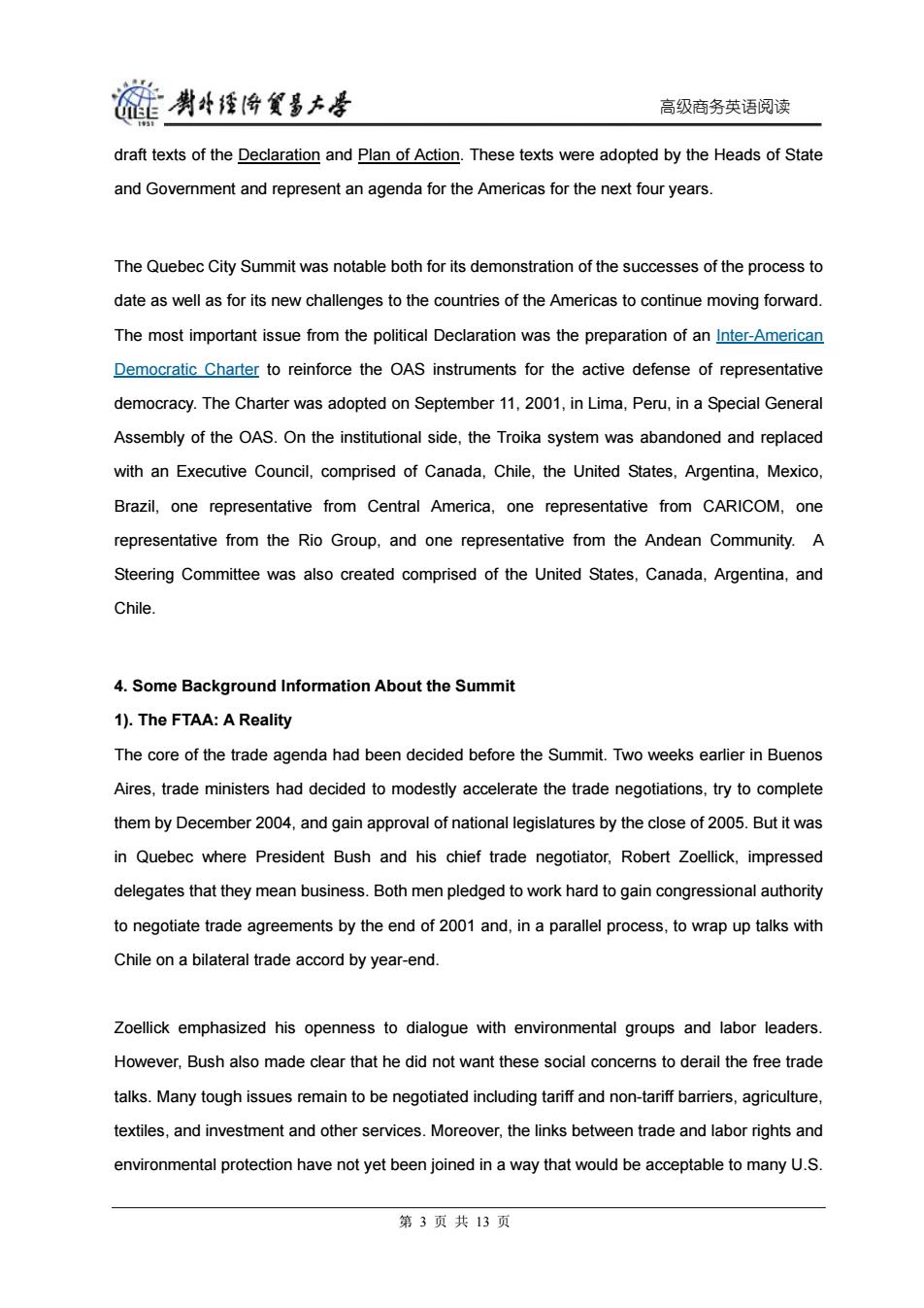正在加载图片...

链剥头经将复多大是 高级商务英语阅读 draft texts of the Declaration and Plan of Action.These texts were adopted by the Heads of State and Government and represent an agenda for the Americas for the next four years. The Quebec City Summit was notable both for its demonstration of the successes of the process to date as well as for its new challenges to the countries of the Americas to continue moving forward. The most important issue from the political Declaration was the preparation of an Inter-American Democratic Charter to reinforce the OAS instruments for the active defense of representative democracy.The Charter was adopted on September 11,2001,in Lima,Peru,in a Special General Assembly of the OAS.On the institutional side,the Troika system was abandoned and replaced with an Executive Council,comprised of Canada,Chile,the United States,Argentina,Mexico, Brazil,one representative from Central America,one representative from CARICOM,one representative from the Rio Group,and one representative from the Andean Community.A Steering Committee was also created comprised of the United States,Canada,Argentina,and Chile. 4.Some Background Information About the Summit 1).The FTAA:A Reality The core of the trade agenda had been decided before the Summit.Two weeks earlier in Buenos Aires,trade ministers had decided to modestly accelerate the trade negotiations,try to complete them by December 2004,and gain approval of national legislatures by the close of 2005.But it was in Quebec where President Bush and his chief trade negotiator,Robert Zoellick,impressed delegates that they mean business.Both men pledged to work hard to gain congressional authority to negotiate trade agreements by the end of 2001 and,in a parallel process,to wrap up talks with Chile on a bilateral trade accord by year-end. Zoellick emphasized his openness to dialogue with environmental groups and labor leaders. However,Bush also made clear that he did not want these social concerns to derail the free trade talks.Many tough issues remain to be negotiated including tariff and non-tariff barriers,agriculture, textiles,and investment and other services.Moreover,the links between trade and labor rights and environmental protection have not yet been joined in a way that would be acceptable to many U.S. 第3页共13页高级商务英语阅读 draft texts of the Declaration and Plan of Action. These texts were adopted by the Heads of State and Government and represent an agenda for the Americas for the next four years. The Quebec City Summit was notable both for its demonstration of the successes of the process to date as well as for its new challenges to the countries of the Americas to continue moving forward. The most important issue from the political Declaration was the preparation of an Inter-American Democratic Charter to reinforce the OAS instruments for the active defense of representative democracy. The Charter was adopted on September 11, 2001, in Lima, Peru, in a Special General Assembly of the OAS. On the institutional side, the Troika system was abandoned and replaced with an Executive Council, comprised of Canada, Chile, the United States, Argentina, Mexico, Brazil, one representative from Central America, one representative from CARICOM, one representative from the Rio Group, and one representative from the Andean Community. A Steering Committee was also created comprised of the United States, Canada, Argentina, and Chile. 4. Some Background Information About the Summit 1). The FTAA: A Reality The core of the trade agenda had been decided before the Summit. Two weeks earlier in Buenos Aires, trade ministers had decided to modestly accelerate the trade negotiations, try to complete them by December 2004, and gain approval of national legislatures by the close of 2005. But it was in Quebec where President Bush and his chief trade negotiator, Robert Zoellick, impressed delegates that they mean business. Both men pledged to work hard to gain congressional authority to negotiate trade agreements by the end of 2001 and, in a parallel process, to wrap up talks with Chile on a bilateral trade accord by year-end. Zoellick emphasized his openness to dialogue with environmental groups and labor leaders. However, Bush also made clear that he did not want these social concerns to derail the free trade talks. Many tough issues remain to be negotiated including tariff and non-tariff barriers, agriculture, textiles, and investment and other services. Moreover, the links between trade and labor rights and environmental protection have not yet been joined in a way that would be acceptable to many U.S. 第 3 页 共 13 页